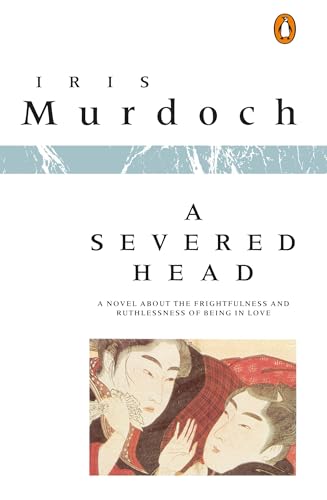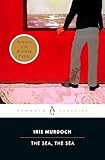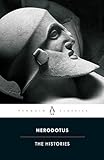
The remarkably prolific Iris Murdoch wrote 26 novels over a 40-year span; today, she’s best known for 1978’s The Sea, the Sea. The novel won the Man Booker Prize, and deservedly so: it’s a world-eating emotional chronicle in which the elderly narrator, Charles Arrowby, tries to fix his greatest mistake: letting his first and only love go. But almost 20 years earlier, Murdoch, who worked and reworked similar moral themes throughout her entire career, wrote a much more potent and incendiary novel than The Sea, the Sea. This delirious little book, A Severed Head, is a dirtier, more bizarre study of the messiness of human desire, complete with incest and spouse swapping, and it’s arguably the better book.
 In selecting A Severed Head for his “top 10 relationship novels” for the Guardian, novelist William Sutcliffe had this to say: “Of all the lots-of-people-screwing-lots-of-other-people novels this is probably the best, and certainly the weirdest. With less philosophising and more shagging than Murdoch’s other books, it is a joy to see this wonderful writer let her hair (and her knickers) down.” Sutcliffe pinpoints what makes A Severed Head such an oddball masterpiece. The novel succeeds by following a structural pattern so obvious — each character sleeps with another character, then another, then another — that it at first seems too easy and too coincidental, but then the obviousness becomes, through repetition, strangely unfamiliar and enigmatic. And because human desire is the rudder of the characters, A Severed Head is one of the great novels about the unknowability of others.
In selecting A Severed Head for his “top 10 relationship novels” for the Guardian, novelist William Sutcliffe had this to say: “Of all the lots-of-people-screwing-lots-of-other-people novels this is probably the best, and certainly the weirdest. With less philosophising and more shagging than Murdoch’s other books, it is a joy to see this wonderful writer let her hair (and her knickers) down.” Sutcliffe pinpoints what makes A Severed Head such an oddball masterpiece. The novel succeeds by following a structural pattern so obvious — each character sleeps with another character, then another, then another — that it at first seems too easy and too coincidental, but then the obviousness becomes, through repetition, strangely unfamiliar and enigmatic. And because human desire is the rudder of the characters, A Severed Head is one of the great novels about the unknowability of others.
The novel begins with Londoner Martin snuggling his mistress, Georgie, as he idly considers whether his wife, Antonia, might find out. The reader might encounter a similar scene in the work of a number of realist contemporaries of Murdoch: John Cheever or Richard Yates or John Updike. Before the snuggling session turns into heavy petting and then rounds third base, there’s just enough time for Martin and Georgie to name every character the reader will meet: Antonia, Palmer (Antonia’s psychoanalyst), Honor (Palmer’s sister), Alexander (Martin’s brother), Rosemary (Martin’s sister). Toward the end of chapter one, the reader is given a hint that Martin’s situation (indeed the situation of all the characters since they are all about to engage in one giant game of sexual musical chairs) is presented only to be torn down:
It was for me a moment of great peace. I did not know then that it was the last, the very last moment of peace, the end of the old innocent world, the final moment before I was plunged into the nightmare of which these ensuing pages tell the story.
The most significant word here is “nightmare,” and the reader quickly discovers why: in chapter three Antonia confesses to Martin that she has been sleeping with Palmer, and is leaving Martin for him.
It’s true that Murdoch subverts the reader’s expectations, but since the Antonia-Palmer affair is revealed in chapter three, this is only the first part of Murdoch’s trick. Indeed, if it turned out that the adulterer was also being cuckolded we’d still be in the safe, predictable terrain of realism. But A Severed Head, a surrealist novel in the guise of a realist novel, doubles down, then triples down on its premise.
Here’s a summary of the novel’s amorous transactions. First, Antonia predictably finds out about Martin-Georgie. But then Martin, after assaulting and slapping Honor (Palmer’s sister) in a basement, realizes he’s in love with her. Then Martin discovers the incestuous relationship between Honor and Palmer. Antonia and Martin make up, but then Alexander (Martin’s brother) announces he’s marrying Georgie. Finally, after Georgie attempts suicide, Antonia tells Martin she’s been sleeping with Alexander for years.
Perhaps the exact points of transition vary for different readers, but A Severed Head goes from realist to straining credibility somewhere around the incest reveal. Except: Murdoch smashes the old rule that you can’t have more than two coincidences in a narrative, and so the book passes through any dubiousness and out the other side, landing finally in a space so exceedingly nonsensical its only forecastable pattern is a kind of kitchen-sink-cum-Murphy’s-law (one is reminded of the scene in the “Cape Feare” episode of The Simpsons, in which Sideshow Bob steps on rakes, repeatedly and for nearly 30 seconds, as the joke becomes funny and then not funny and then funny again, but in a twisted manner). Somewhere around the second or third revelation that one of these characters is sleeping with another one, you stop expecting the unexpected and begin expecting everything. It’s as if Murdoch is saying, “Yes, that can happen. And so can this.” And if she can get you to buy into her rules that completely, isn’t that its own kind of realism?

 The illogic of the design of A Severed Head is so perfect as to be logical. The reader is reminded of the sister/daughter slapfest in Chinatown or, even more exactly, the slap at the end of John Fowles’s The Magus. The slap, that amazing image of flabbergasted absurdity, is an especially appropriate image since the point in A Severed Head when Martin slaps Honor is more or less the hinge that divides the two halves of the book (half one is Martin’s blissful ignorance, half two is the cascade of truths). Even the respective language in Fowles and Murdoch is similar.
The illogic of the design of A Severed Head is so perfect as to be logical. The reader is reminded of the sister/daughter slapfest in Chinatown or, even more exactly, the slap at the end of John Fowles’s The Magus. The slap, that amazing image of flabbergasted absurdity, is an especially appropriate image since the point in A Severed Head when Martin slaps Honor is more or less the hinge that divides the two halves of the book (half one is Martin’s blissful ignorance, half two is the cascade of truths). Even the respective language in Fowles and Murdoch is similar.
Fowles:
I do not know why I did what happened next. It was neither intended nor instinctive, it was neither in cold blood nor in hot; but yet it seemed, once committed, a necessary act; no breaking of the commandment. My arm flicked out and slapped her left cheek as hard as it could. The blow caught her completely by surprise, nearly knocked her off balance, and her eyes blinked with the shock; then very slowly she put her left hand to the cheek. We stared wildly at each other for a long moment, in a kind of terror: the world had disappeared and we were falling through space. The abyss might be narrow, but it was bottomless.
Murdoch:
I could see her face just below mine, the black hairs on her upper lip, the white of her teeth. I lifted myself a little and with my free hand struck her three times, a sideways blow across the mouth. She closed her eyes and tried to turn her head away. I saw that clearly in retrospect too.
After I had hit her the third time I began to wonder what I was doing. I let go and rolled off her. She got up without haste while I got myself into a sitting position. My head, suddenly asserting its existence, felt terrible. She brushed down her coat and then without looking at me and still without haste she mounted the cellar steps.
I sat quiet for a minute feeling extremely confused. Then, holding my head, which felt ready to break open, I got shakily to my feet.
The dream/nightmare theme remains throughout. As he creeps toward Honor’s bedroom, where he will find her with her brother, Palmer, Martin thinks, “By now I scarcely knew what I was doing. My movements took on the quality of a dream.” At one point Martin pleads with his mistress, Georgie, “in the name of that reality.” Preceding her suicide attempt, Georgie sends a box of her hair to Martin who, trying to convince himself briefly not to assume the worst, thinks, “The arrival of the hair had had the heavy significance of a token in a dream; but there was no need to apply nightmare logic to it.” Except it turns out he should think the worst because Georgie is at that moment unconscious on the floor of her apartment. And, it seems not insignificant that the book is told in Martin’s first-person narration, as a dream or nightmare would be.
 The most surreal, dream-like scene happens in the middle of the book when Martin, “somewhat tipsy,” encounters Honor in the dining room. She has a samurai sword. Martin asks her about the sword and when Honor, an anthropologist, replies that she obtained it while working, it seems to Martin that “she spoke as out of a deep dream.” Martin asks her to “show me something.” Honor tosses napkins into the air and slices them in half. Martin thinks, “I felt an intense desire to take the sword from her, but something prevented me.” Then Honor, no longer “attending to” Martin, “moved the sword back and laid it across her knees in the attitude of a patient executioner.” This strange scene, packed with halts and nebulous logic, bores so deeply into Martin’s psyche that he has a dream about it, at which point the book folds in on itself and refracts its own strangeness. By the very last scene of the novel, in which Honor cites the apt story of Candaules and Gyges from Herodotus’s The Histories (in which king Candaules pridefully shows Gyges his naked wife and Gyges kills Candaules, becoming king), we know the mythical has more currency than the “real.”
The most surreal, dream-like scene happens in the middle of the book when Martin, “somewhat tipsy,” encounters Honor in the dining room. She has a samurai sword. Martin asks her about the sword and when Honor, an anthropologist, replies that she obtained it while working, it seems to Martin that “she spoke as out of a deep dream.” Martin asks her to “show me something.” Honor tosses napkins into the air and slices them in half. Martin thinks, “I felt an intense desire to take the sword from her, but something prevented me.” Then Honor, no longer “attending to” Martin, “moved the sword back and laid it across her knees in the attitude of a patient executioner.” This strange scene, packed with halts and nebulous logic, bores so deeply into Martin’s psyche that he has a dream about it, at which point the book folds in on itself and refracts its own strangeness. By the very last scene of the novel, in which Honor cites the apt story of Candaules and Gyges from Herodotus’s The Histories (in which king Candaules pridefully shows Gyges his naked wife and Gyges kills Candaules, becoming king), we know the mythical has more currency than the “real.”
Toward the end, as Martin and his wife, Antonia, are briefly sort-of making up, one of the narrative tensions is the question of whether Martin staying with Antonia is “right.” Psychoanalyst Palmer first encourages Martin to leave her, then states, “On reflection I feel sure that in returning to Antonia and mending your marriage you have done the right thing.” But there is no “right thing” because the book’s scope includes nothing outside of the blending relationships between the characters. Very little of the outside world is shown; the book is a series of scenes in which different combinations of characters are situated together — Martin goes to visit Palmer; Antonia visits Martin; Martin picks up Honor at the train station; Martin visits Alexander’s studio; all the while, characters are meeting off-stage and then meeting Martin to reveal the results. The world of A Severed Head is restricted to conversations in rooms (the extent of our knowledge really only includes the occupations of the characters, and London is foggy throughout); how can there be a right or wrong answer to Martin leaving Antonia if we don’t know what the world contains if he leaves? During Martin’s profession of his love to Honor, she tells him, “Your love for me does not inhabit the real world. As real people we do not exist for each other.” But we aren’t in the real world. Are we? In a narrative guided only by the affections of the characters, Murdoch so rapidly scrambles them that no relationship seems viable or trustworthy at all. Who is to say, finally, that even Martin’s love for Honor is to be trusted? Given the book’s final conversation, even the characters themselves are aware of the unreliability of anything. “I wonder if I shall survive it,” Martin says.
Murdoch’s body of work is consistently concerned with the space between order and chaos — The Sea, the Sea, in fact, is an extended series of asides from, accidents against, disruptions of, and derailments from its premise. But in A Severed Head, one of her shortest books, the reader can experience perhaps her most harmonious blend of the two. Like a small diamond full of inclusions, it paradoxically depicts human life at its most crystallized and muddied.








